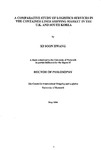Comparative study of logistics services in the container liner shipping market in the U.K. and South Korea
| dc.contributor.supervisor | Gray, Richard | |
| dc.contributor.author | Hwang, Ki Soon | |
| dc.contributor.other | Plymouth Business School | en_US |
| dc.date.accessioned | 2011-05-13T08:07:11Z | |
| dc.date.available | 2011-05-13T08:07:11Z | |
| dc.date.issued | 2004 | |
| dc.identifier | Not available | en_US |
| dc.identifier.uri | http://hdl.handle.net/10026.1/447 | |
| dc.description.abstract |
In line with the dramatic changes of business environment, certain liner shipping companies have claimed that what they are providing is a 'logistics service' rather than a 'traditional shipping service'. It was found that there is a shortage of discussion in existing literature related to the liner shipping industry regarding the introduction of logistics service and no empirical study on how the operation of such a logistics service has been perceived by shippers. The prime objective of the research is to provide a practical clarification to understanding an operation of logistics service in the liner shipping market. The Delphi technique was used to investigate the difference between the features of traditional shipping service and those of logistics services. It also explored the driving forces, which appear to stimulate liner shipping service providers to adopt logistics service concepts into their business area. A mail questionnaire was developed to analyse shippers' perception of logistics service and measure the performance of logistics service operation with reference to the international shippers in the U. K. and South Korea. An analysis of the survey revealed that there is a significant association between years in business and the perception of logistics service. With regard to the analysis of relationship between service providers' performance and choice of service providers, the research reached an answer by analysing the correlation between service providers' performance and the behaviour of choosing service providers. A positive correlation was found for transport, payment, and cargo related factors. On the other hand, no correlation was found for the document factor. With reference to these findings, service providers could initiate the target marketing for various classes of shippers. The comparisons between the U. K. and South Korean shippers were made in terms of the level of satisfaction on the service functions. The Delphi technique indicated the exploratory findings related to the conceptualisation of logistics service in the liner shipping market. The research dealt with experts' points of view only, albeit in some depth. However, the conceptualisation would be more developed if the views of service providers and service consumers were also sought. Based upon the size of the sample, caution must be exercised when making any broad generalisation. The research makes an original contribution to knowledge by applying a service function approach to a logistics service concept in the liner shipping context for the first time. The researchf indings could help explain consumers' assessmenot f their service provided in a wider variety of industries and therefore add to the understanding of perceptions and the assessmenot f the nature of logistics service operations. | en_US |
| dc.language.iso | en | en_US |
| dc.publisher | University of Plymouth | en_US |
| dc.title | Comparative study of logistics services in the container liner shipping market in the U.K. and South Korea | en_US |
| dc.type | Thesis | |
| dc.identifier.doi | http://dx.doi.org/10.24382/3222 | |
| dc.identifier.doi | http://dx.doi.org/10.24382/3222 |
Files in this item
This item appears in the following Collection(s)
-
01 Research Theses Main Collection
Research Theses Main


